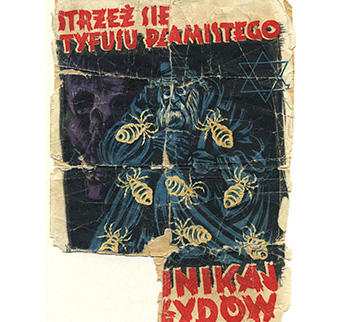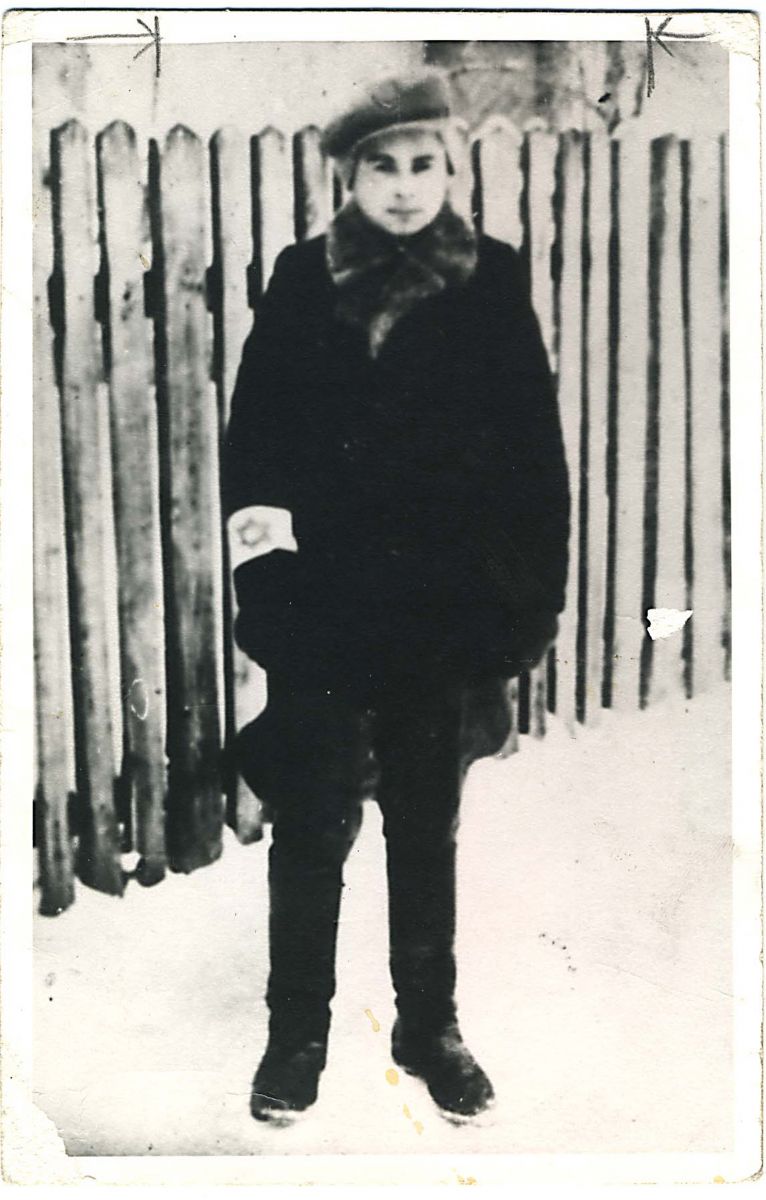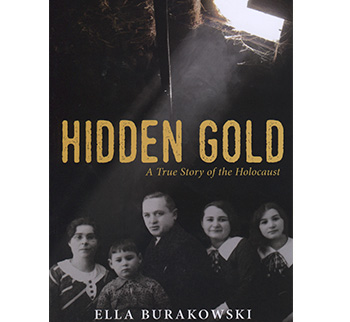EXCERPT: The Gold family seeks shelter from the Nazis, only to find themselves discarded and surrounded instead
Marian knew the lay of the land and was able to guide them unseen through the mountainous terrain. His own life depended on it as well.
The trek to Pilarski’s was uneventful. So much had happened in such a short span they were already losing track of time, but it was still morning on Oct. 7, 1942, when they made it to Pilarski’s farm.
“Hanna, you and the children stay there, and remain out of sight,” Marian said as he pointed to a wooded area. They all moved quickly into the brush. Hanna watched as Marian walked down the hill toward the lane that led to the farm. From their elevated vantage point, they could see the layout of the property. It was large, with a two-storey farmhouse. White horizontal fencing separated the home from the barn and stables. Hanna could see the leftover rows of potatoes that had not yet been harvested from the fields. Pigs roamed in their pens, and a few cows grazed in the distance.
Someone answered the door, but Hanna could not make out who it was. Marian disappeared into the house. It seemed like forever before there was any more movement at the farm, but finally Marian came out. He watched his feet as he climbed back up the hill, avoiding the fallen tree branches.
“Here’s the plan,” he said when he reached them. “Pilarski is willing to hide you for now, but made no commitment for how long. The deal Leib made with him was for David only, so to hide the rest of you, he wants an additional thousand zloty for each person.”
Without hesitation, Hanna agreed. She took 3,000 zloty from her boot and handed it to Marian.
Together they all walked down the hill.
Pilarski was feeding the pigs when Marian and the Golds approached. He stopped what he was doing.
“Where’s the money?” Pilarski did not make eye contact, or even look in the direction of Hanna and her children. He spoke directly to Marian.
Marian wanted some reassurances before he handed him the cash. “You will hide all of them for this money, correct?”
Pilarski was fixated on Marian’s pocket. He knew there was cash in it.
“Yes, yes,” Pilarski assured Marian, “you have nothing to worry about. They’ll be perfectly safe here.”
Marian pulled his hand from his pocket and gave the money to Pilarski. He counted every zloty and then looked up at Marian. “You go,” he said. “Leave the Jews with me.”
Hanna didn’t like how that sounded, and for that matter, neither did Marian. He turned to Hanna. “You’ll be fine here for a while. Take care of the children, and stay safe.”
“Thank you for all you’ve done for us, Marian. Leib would be so grateful to know how you have helped his family. I hope one day in the near future we can enjoy ourselves over dinner like we used to.”
Marian felt guilty that he couldn’t do more for them. He had no choice but to leave them with Pilarski even though, deep down, he didn’t trust the man. He could only hope he had done right by Leib. He felt a pang of guilt recognizing that, in truth, he was relieved to be free of the responsibility and burden of hiding them. He went over to David and crouched down to his height. “You’ll be fine here, David. Remember our little talk. Take care of the ladies, my son.” He pulled David in for one last hug and turned to leave. He walked back to his home, a load off his mind, but in his heart he feared they would not survive.
Pilarski still had not looked directly at any of them. “Follow me,” he said. Behind the stable was an old, battered, wood structure. It was small and smelled like it might have had manure stored in there at one time.
“Get in there,” he ordered. They entered, and Pilarski closed the door behind them. Fortunately, there was plenty of light as the wooden slats had so many breaks and holes that the light streamed through every crevice.
Esther, was very good at finding the positive in a bad situation. She had blossomed into a strong, confident young woman.
“Look here,” she said. “We can take these bales apart and cover the dirt floor with straw. We’ll be fine here for a while, you’ll see.”
Shoshana and David took their cue and started to pull out the straw from the well-formed bales. David knew it would be easier if he used his switchblade to open the bales but was afraid to reveal it to his mother. She would confiscate it, and he had no intention of letting that happen. David was making decisions by himself now. He had to think what would be best for his family, what his father would do, so he continued to undo the bales by hand and kept the weapon a secret. It took a couple of hours, but they managed to make an acceptable area to rest on. It was getting late, and Hanna still had the bag of food Frania packed. She pulled it out to eat, but decided to ration it, as they had not seen Pilarski since he’d ordered them into the shed.
Pilarski was back at the house rehashing his commitment. What was he thinking, offering to help these Jews?
German propaganda claiming Jews were evil had intensified. Movies and posters depicting them as corrupt, filthy, and lazy circulated. They were shown as people who had taken control of the banks and were blamed for every person’s unfortunate situation. The propaganda equated Jews to rats. Comparing Jews to vermin would dehumanize them, making it more acceptable to eliminate them. Drawings were posted, showing Jews with large, hooked noses, warts, and dirty, roach-infested beards. Warnings of typhoid and other diseases were written in red letters, meant to look like blood.
Many Polish people had come to believe this propaganda, and Pilarski was no exception. He’d begun blaming Jews a year ago; around the same time he had trouble putting food on the table. After Kristallnacht, the two-day Nazi rampage that started on Nov. 9, 1938, leaving almost 100 Jews dead and 30,000 arrested, it was easy to believe Jews were the enemy. It was safer to believe it too.
A few hours later, Hanna heard Pilarski’s heavy footsteps. She was hopeful that he was bringing some food. The door opened, and he stood there, once again not looking directly at them. He seemed to be looking past them, over their heads.
“Leave all your things, and get off of my farm,” he said in a deep commanding voice.
“What about our deal?” Hanna asked.
“The deal is off. The Germans have invaded the town, and I’m not putting myself in danger for Jews. Get out now.” His face was red, and he spat as he spoke.
With a jerk of her head Hanna motioned to the children. They immediately got up, brushed themselves off, picked up their belongings, and prepared to leave.
“Drop everything and go. Now!” he shouted.
With the efficiency of a seasoned thief, Esther hid her mother’s sack under her coat as the rest of them put their belongings on the ground and left the shed.
Hanna thought she would try to get their money back. As she walked past him she said, “If the deal is off, then return our money.”
“GET OUT!” he bellowed as he picked up a pitchfork.
They fled up the hill, retracing their original path. After only a few hundred metres they heard a deep voice shouting in Polish, “Hey, Jews!” It was not Pilarski’s voice. This voice was much raspier.
Hanna moved behind David and whispered, “Don’t answer. Keep moving.”
Focused on the forest ahead, they hoped they could lose whoever was calling in the thick brush. They picked up their pace, but did not run.
At that moment David remembered his father’s words when he was being chased by a large dog. “Never look strange dogs in the eye. They will consider it a challenge. If you want to get away, stand tall with your shoulders back, and walk quickly with confidence, but do not run.”
David immediately straightened up, put his shoulders back and walked with his head held high.
This time a different voice spoke from behind them. “Hey, Jews! Where you going? We’re not finished with you.”
From the forest two more men appeared. The Golds couldn’t move forward or backward. More people emerged from the left and the right. Carrying shovels, pitchforks, and makeshift weapons, these threatening assailants advanced slowly toward them. One of the men laughed.
 He’s enjoying our fear, Hanna thought.
He’s enjoying our fear, Hanna thought.
Another man staggered toward them, drinking from a tarnished silver flask. From their clothes, it was clear they were all farm workers.
Hanna and her children backed into a circle, each facing a different direction. Clutching at each other’s coats, they dared not take their eyes off the approaching men. They were surrounded.
Sobowice was a small town, and Pilarski must have put the word out that he was releasing Jews. These men had come out to harass them, maybe even kill them.
They were growing in numbers, and there was no escape. Then the heckling began.
“Dirty Jews.”
“Take your diseases back where you came from.”
“Go back to the gutter with the rats that you are.”
Hatred spewed as they fed off each other’s energy. Waving their weapons and fists in the air, they chanted a common phrase over and over in an awful drone: “Give the Jews to the Germans.”
The crowd grew, and now there were at least 20 men. Hanna was sure they were going to be killed.
David recalled the horrible vision of Mr. Zimmerman in pain, holding his stomach, with the blood spewing between his fingers. In that moment David prayed, “Please, please, God, let someone shoot me in the head. I don’t want to die a slow death like Mr. Zimmerman.”
Hanna wanted to at least save David, her youngest child, the only one that could carry on the family name.
“Please, leave us alone,” she cried out to them. “Go home. We will leave quickly and not bother you. My son is going up the hill. You can take us if you must, but he is going to leave,” she said in an assertive tone.
The farmers could trade these four Jews to the Germans for eight kilos of sugar. They were not letting David go anywhere.
David felt up his sleeve for the knife Marian had given him. He wanted to use it, but there were just too many of them. A few of the men moved in closer. One of them looked directly at him. “Give me your clothes.”
David stood tall, as his father had instructed. He did not look the man in the eye, but did not back away, either. As the man moved dangerously close, David braced himself knowing he was about to be struck. It wasn’t until a split second before the man’s arm made contact that he caught a glimpse of the blade clutched in the fellow’s hand. David instinctively raised his own arm to protect his face as the knife came down and plunged into the back of David’s hand. The ruffian watched for the boy’s reaction, but David did not flinch. He stayed tall and complied with his original command to remove his coat.
The blood dripping from David’s hand energized the mob, and their chanting grew louder. Hanna began reciting the Shema, a Jewish prayer said when one is ready to die. David watched the blood oozing from his wound and was surprised it didn’t hurt. It took a few minutes before the throbbing set in.
Esther instinctively placed herself between her brother and his attacker. Without hesitation the farmer pushed hard enough to throw her to the ground.
As the farmers were just about to swarm, an imposing command came from beyond the mad scene.
“STOP!”
Everyone turned to see two burly men walking toward them. The smaller of the two had a gun pointed straight at the crowd.
The two men moved closer. They had the attention of the farmers. The larger of the two spoke in Polish.
“Are you all crazy? What do you think you’re doing, have you all lost your minds? Do you have any idea what’s going on out there?”
His friend still had the gun drawn, his finger on the trigger. Surprisingly, the farmers listened as he continued.
“We’ve just come from Germany; we escaped from a labour camp. The Germans are killing all the Poles as well as Jews. Do you really want to help them? Do you really have to be their instruments and do their dirty work for them? They’re coming for you, too. Who will save you and your families?” He became more enraged as he went on. “Let these people go. They’ve done nothing to you. You have two choices: either go back to your homes and your families while you still can, or die here.” The large man looked over at the gun his friend had pointed at them.
His words actually cut through the collective hatred. Some of the men made disparaging remarks to save face, but they all backed off and dispersed. Hanna breathed a sigh of relief, but unable to control her shaking legs, she grabbed on to Shoshana for support.
 Esther got up off the ground and moved closer to David to examine his hand. She took off one of her extra socks and wrapped it tightly around his wound to stop the bleeding.
Esther got up off the ground and moved closer to David to examine his hand. She took off one of her extra socks and wrapped it tightly around his wound to stop the bleeding.
Shoshana steadied her mother and then sprang into action. She could hear her father’s voice in her head. Blue eyes and fine features. Shoshana was an attractive woman. She was 23 and had those intense blue eyes, a small button nose, and a beautiful smile. Her thick, dark hair accentuated her ivory skin and made her appear more Polish than Jewish. She had a sultry demeanour men were drawn to, and she could use it if she had to.
She walked over to the two Poles who had just saved them and with a flirtatious intonation said, “You men were wonderful. How can we ever thank you? I don’t want to think what would have happened if you hadn’t come along.”
While she was talking, she was also analyzing. She needed their help, but was afraid to trust them. Even though they acted like good people, she was not taking any chances.
As a symbol of respect, one of the men removed the hat he was wearing while Shoshana spoke. “Can you help us find a safe place?” she asked.
Hanna intervened, “Do you know how to get to Dzialoszyce? We would be very grateful, and we can pay you for your help if you can take us there.” Hanna had heard that the Jews in Dzialoszyce were working in ghettos and had not all been deported to concentration camps. She thought if they could get there, they might buy some time, while they figured out what to do next. Leib’s cousin Aaron lived there, and Hanna knew how to find the house if she could only get to Dzialoszyce. She knew it was about 25 kilometre south of Pinczow and figured it would take them the better part of the night to reach it.
At the offer of money, the two men looked at each other, and, once again, the larger man spoke. “We were headed in that direction anyway, so you can come with us.”
Shoshana caught the calculating look the two men had given each other, and she didn’t want to be robbed. She quickly placed herself between the two of them, and in a playful manner she interlaced her arms through theirs, one on either side of her. “Come boys,” she said coyly. “You show us the way.” She began to lead with a smiling man on each arm.
Excerpted from Hidden Gold, a True Story of the Holocaust by Ella Burakowski.
Published by Second Story Press.
